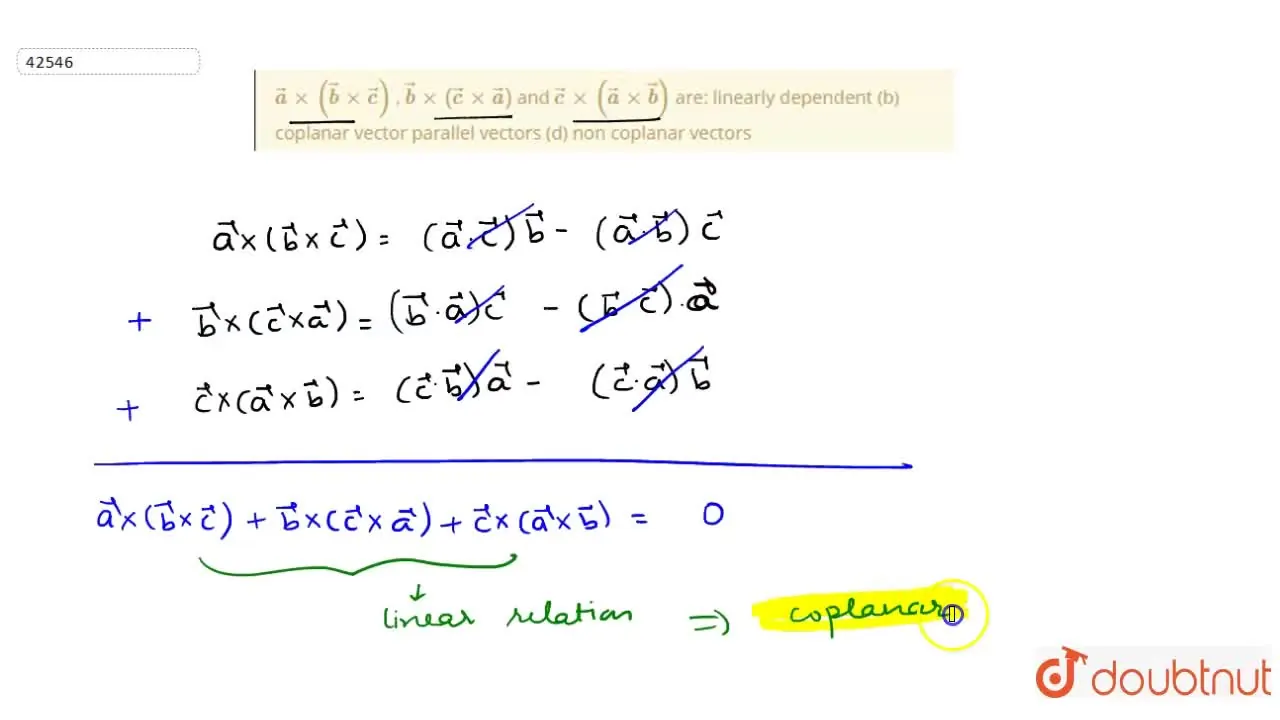→a×(→b×→c) , →b×(→c×→a) and →c×(→a×→b) are: linearly dependent (b) coplanar vector parallel vectors (d) non coplanar vectors
Step by step video & image solution for vec axx( vec bxx vec c) , vec bxx( vec cxx vec a) and vec cxx( vec axx vec b) are: linearly dependent (b) coplanar vector parallel vectors (d) non coplanar vectors by Maths experts to help you in doubts & scoring excellent marks in Class 12 exams.
Related Playlists
Similar Questions
If the vectors →a+→b+→c,→a+λ→b+2→c,−→a+→b+→c are linearly dependent then λ
View Solution36. If →a,→b,→cand→d are unit vectors such that (→a×→b).→c×→d=1 and →a.→c=12 then a) →a,→band→c are non-coplanar b) →b,→c,→d are non -coplanar c)→b,→d are non parallel d) →a,→d are parallel and →b,→c are parallel
View SolutionShow that the vectors 2→a−→b+3→c,→a+→b−2→cand→a+→b−3→c are non-coplanar vectors (where →a,→b,→c are non-coplanar vectors)
View SolutionIf (→a×→b)×(→b×→c)=→b,where→a,→b,and→c are nonzero vectors, then →a,→b,and→c can be coplanar →a,→b,and→c must be coplanar →a,→b,and→c cannot be coplanar none of these
View SolutionSolve the following equation for the vector →p;→p×→a+(→p.→b)→c=→b×→c where →a,→b,→c are non zero non coplanar vectors and →a is neither perpendicular to →b non to →c hence show that ⎛⎜ ⎜⎝→p×→a+[→a→b→c]→a⋅→c→c⎞⎟ ⎟⎠ is perpendicular →b−→c.
View SolutionLet →a,→band→c, be non-zero non-coplanar vectors. Prove that: →a−2→b+3→c,−2→a+3→b−4→cand→c−3→b+5→c are coplanar vectors. 2→a−→b+3→c,→a+→b−2→cand→a+→b−3→c are non-coplanar vectors.
View SolutionIf a,bandc are non-cop0lanar vector, then that prove ∣∣∣(→a.→d)(→b×→c)+(→b.→d)(→c×→a)+(→c.→d)(→a×→b)∣∣∣ is independent of d,wheree is a unit vector.
View SolutionIf →a is a non-zero vector and →a.→b=→a.→c,→a×→b=→a×→c, then
View SolutionIf →a×→b=→b×→c≠0, where →a,→band→c are coplanar vectors, then for some scalar k
View SolutionIf →a and →b are orthogonal unit vectors, then for a vector →r noncoplanar with →a and →b , vector r×a is equal to a. [→r→a→b]→b−(→r.→b)(→b×→a) b. [→r→a→b](→a+→b) c. [→r→a→b]→a−(→r.→a)→a×→b d. none of these
View Solution


